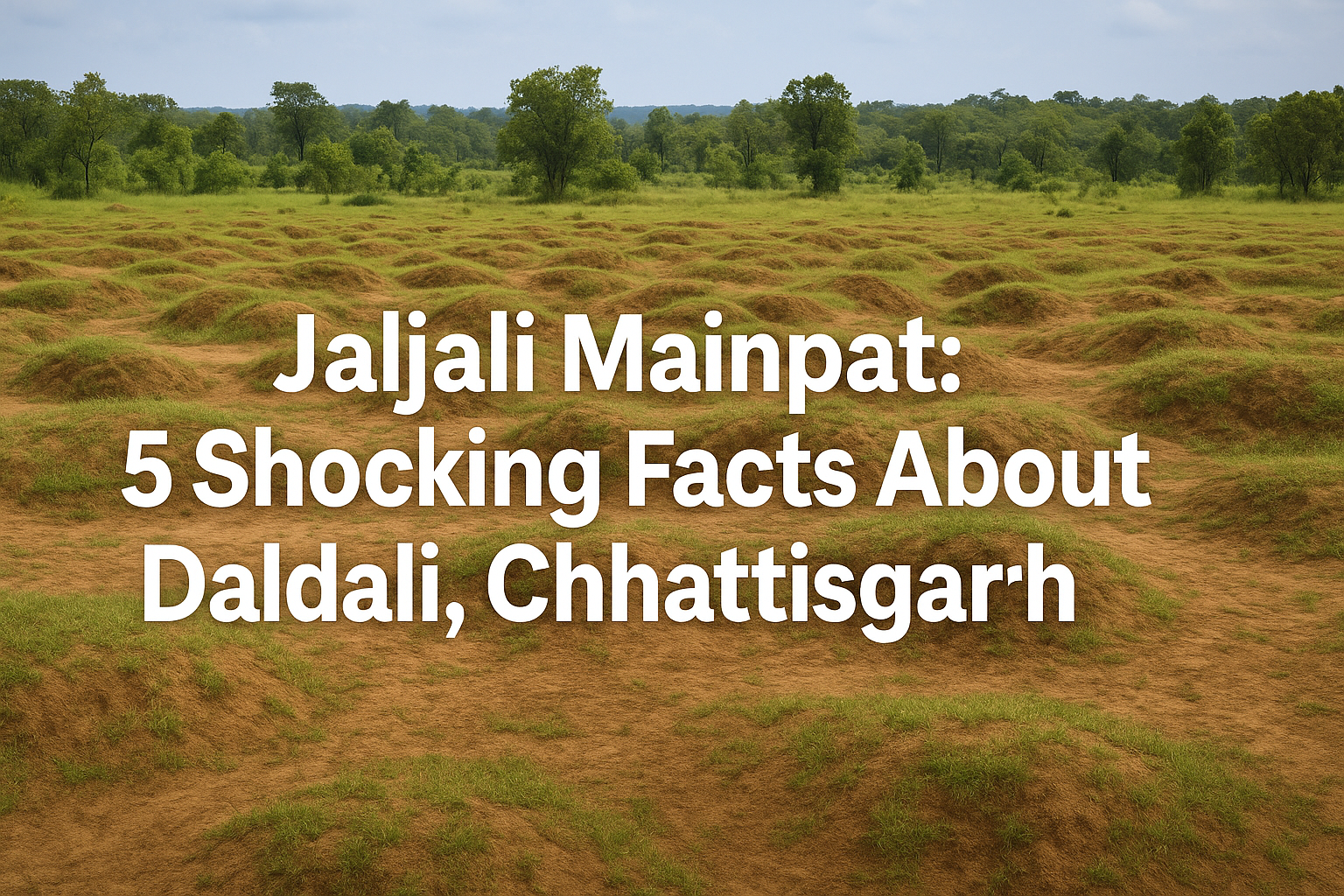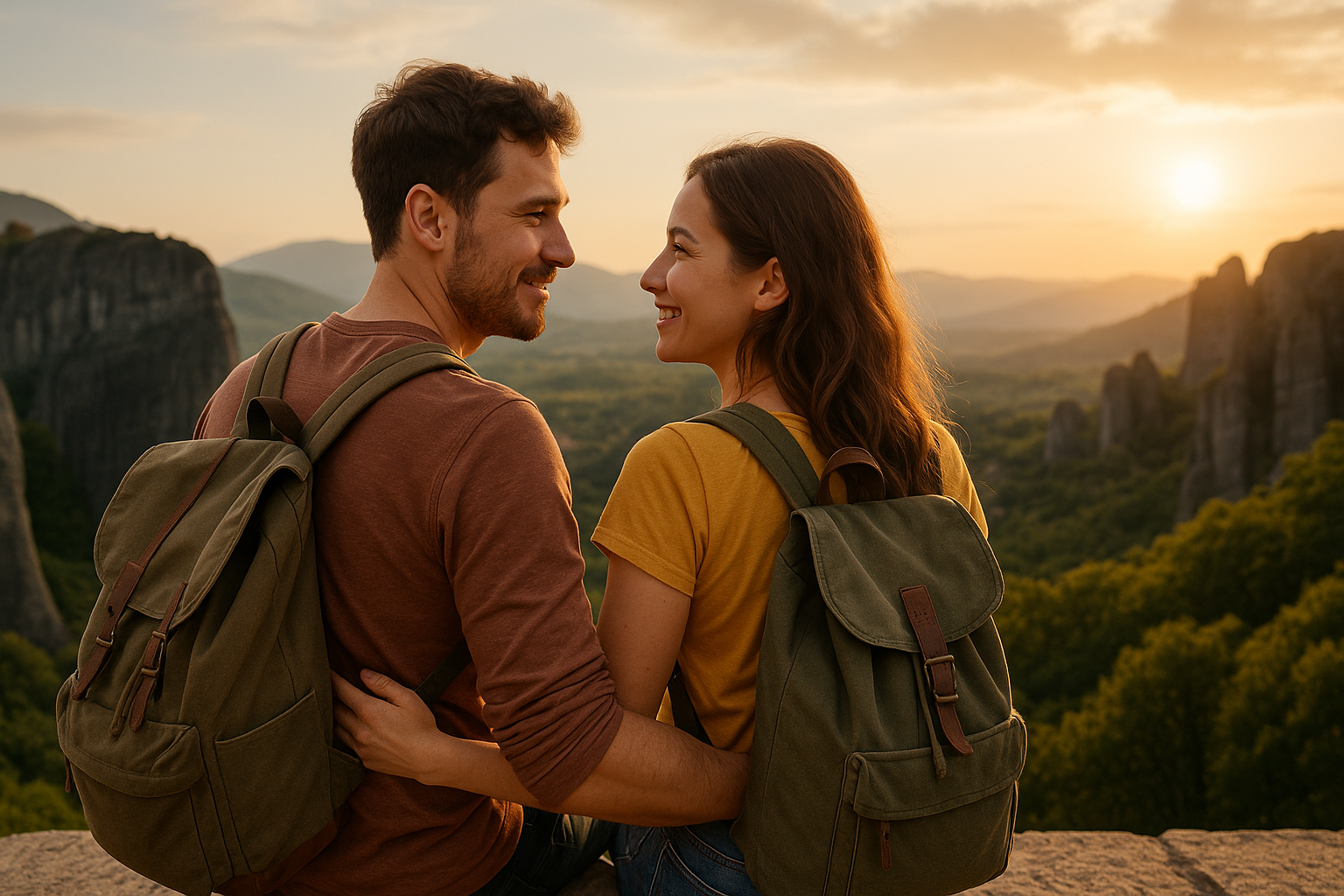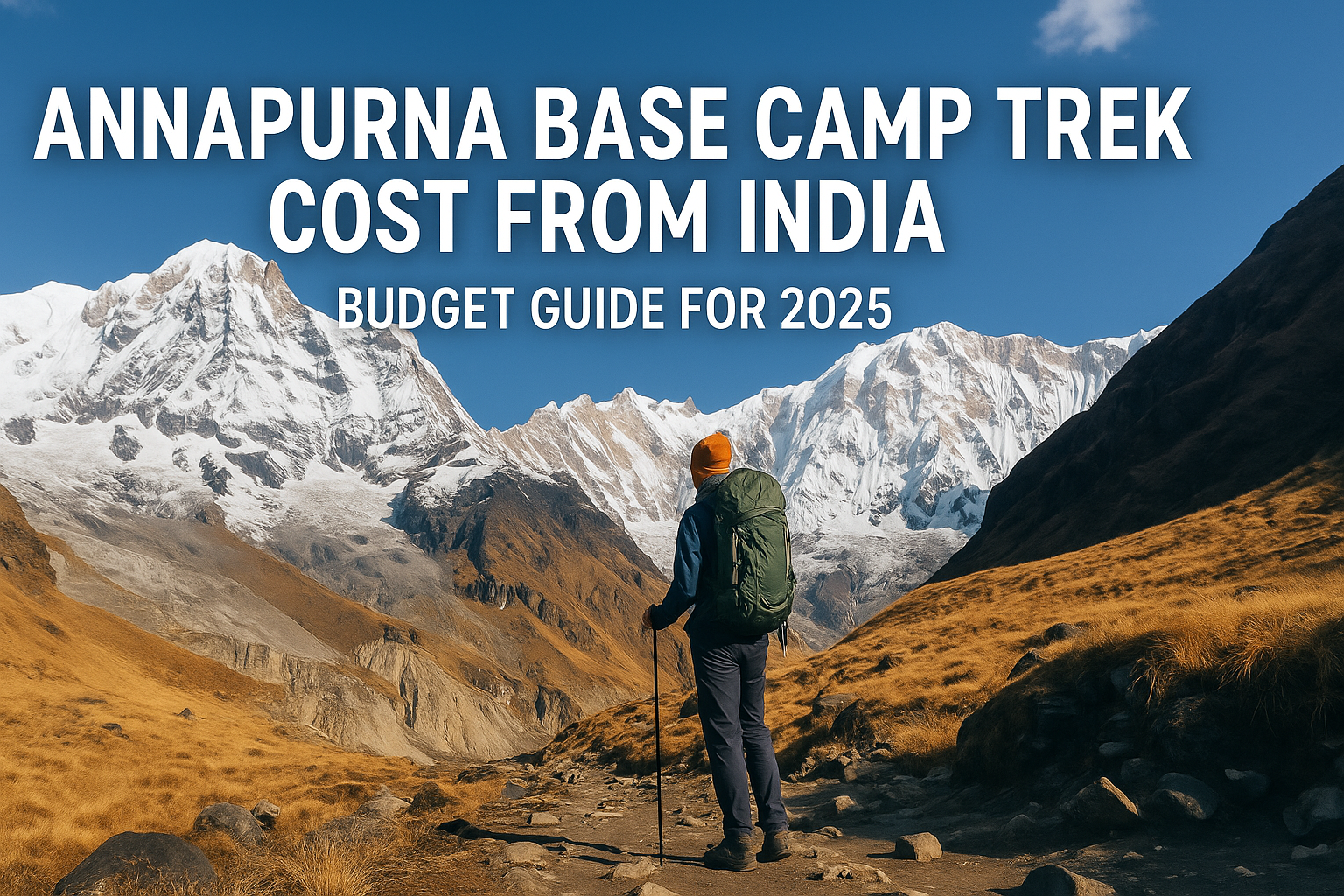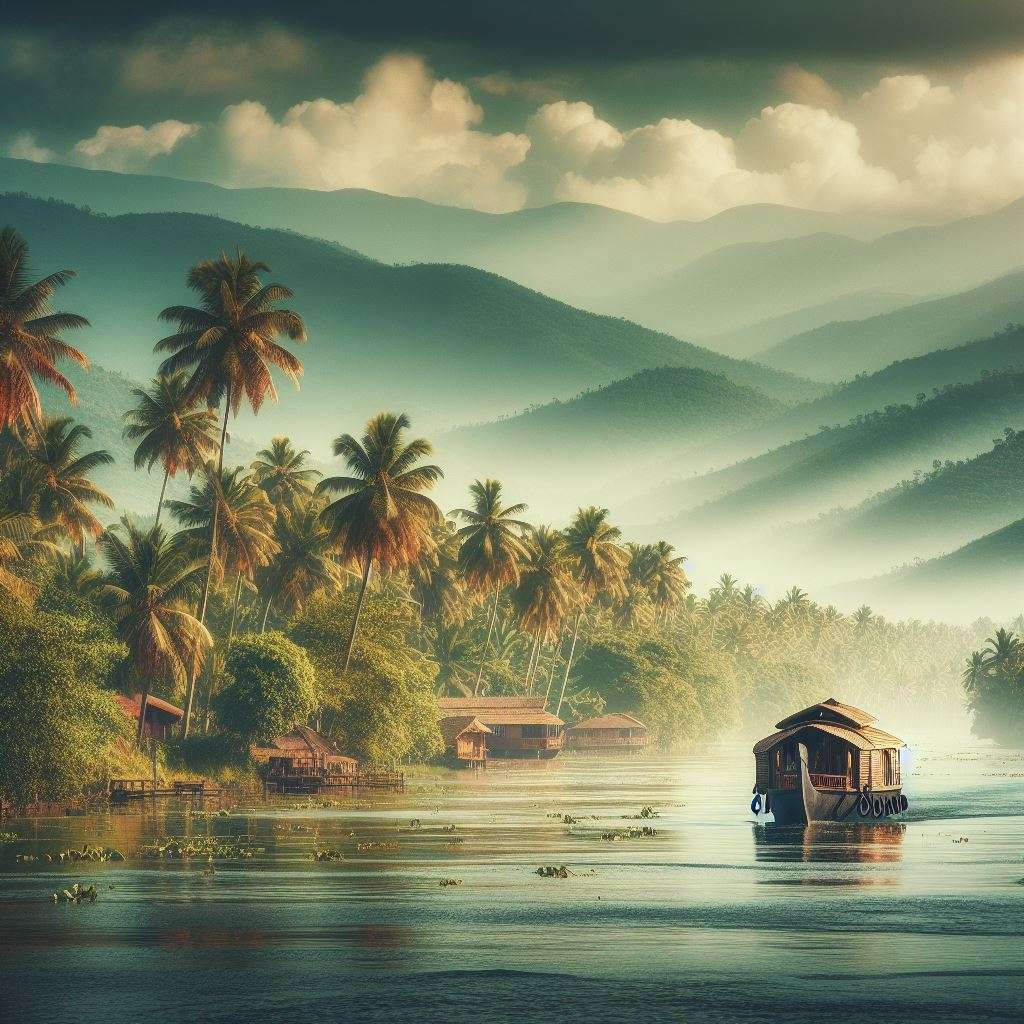Introduction to Kerala
Kerala, often referred to as ‘God’s Own Country,’ is a gem in the southwestern region of India. Known for its lush landscapes, serene backwaters, and pristine beaches, Kerala offers a diverse array of experiences that attract tourists from around the globe. The state’s unique geographical features include an extensive network of rivers, lagoons, and lakes that form the famous backwaters—a tranquil escape perfect for houseboat cruises and scenic views.
Beyond its waterways, Kerala boasts verdant hill stations such as Munnar and Wayanad, where rolling tea plantations and cool, misty air provide a refreshing retreat from the tropical heat. These hill stations are not only visually stunning but also serve as ideal spots for trekking, wildlife spotting, and enjoying the region’s rich biodiversity. For beach lovers, the state offers golden sands and azure waters in locations like Kovalam, Varkala, and Marari, each providing a unique blend of relaxation and adventure.
Kerala’s cultural heritage further enhances its allure. The state is a melting pot of traditions, with classical dance forms like Kathakali and Mohiniyattam, intricate temple architecture, and vibrant festivals such as Onam and Thrissur Pooram. These cultural highlights offer visitors a deep dive into the region’s rich history and artistic expressions. Additionally, Ayurvedic treatments and wellness retreats in Kerala have gained international acclaim, making it a sought-after destination for holistic healing.
Key attractions in Kerala include the Periyar Wildlife Sanctuary, the historic port city of Kochi, the tranquil backwaters of Alleppey, and the picturesque hill station of Thekkady. Each of these destinations provides a unique glimpse into the diverse experiences that Kerala has to offer, ensuring that every traveler finds something to cherish. Whether you seek adventure, relaxation, or cultural immersion, Kerala promises an unforgettable journey through one of India’s most enchanting states.
Best Time to Visit Kerala
Kerala, often referred to as “God’s Own Country,” offers a diverse and rich travel experience throughout the year. However, understanding the seasons and their impact on your travel plans can enhance your visit significantly.
Kerala experiences three main seasons: summer, monsoon, and winter. The summer season, which spans from March to May, can be quite hot and humid with temperatures ranging from 29°C to 40°C. While this period is considered off-peak for tourism, it is a great time to explore hill stations like Munnar, Wayanad, and Thekkady, where the weather remains relatively cool and pleasant.
The monsoon season in Kerala, from June to September, brings heavy rainfall due to the southwest monsoon. While the lush greenery and rejuvenated landscapes are incredibly beautiful during this time, travel plans can be disrupted by frequent downpours. Nevertheless, this season is highly recommended for those interested in Ayurvedic treatments, as the monsoon is believed to enhance the effectiveness of these therapies. Moreover, the Nehru Trophy Boat Race, a major cultural event, takes place in August, providing a unique cultural experience.
The winter season, from October to February, is considered the best time to visit Kerala for most tourists. During these months, the weather is cool and comfortable, with temperatures ranging from 20°C to 32°C. This period is ideal for beach holidays in popular destinations like Kovalam, Varkala, and Marari. Additionally, the backwaters of Alleppey and Kumarakom are best explored during this season, offering serene houseboat cruises and picturesque landscapes.
In summary, the best time to visit Kerala depends largely on your travel preferences. For beach holidays and backwater cruises, the winter season is optimal. If hill stations and cooler climates are your interests, consider visiting during the summer. For cultural experiences and Ayurvedic treatments, the monsoon season offers a unique charm despite the occasional inconvenience of rain. By aligning your travel plans with Kerala’s seasonal variations, you can ensure a memorable and enriching experience.
Kochi
Kochi, often referred to as the “Queen of the Arabian Sea,” is a melting pot of cultures and histories. This port city boasts a unique blend of colonial-era architecture, vibrant marketplaces, and scenic backwaters. Key attractions include the iconic Chinese Fishing Nets, the historic Fort Kochi area, and the beautiful Mattancherry Palace. Visitors can also explore the Jewish Synagogue and the bustling spice markets, providing a glimpse into Kochi’s rich past and vibrant present.
Munnar
Munnar, nestled in the Western Ghats, is a haven for nature lovers and adventure enthusiasts. Known for its sprawling tea plantations, rolling hills, and misty landscapes, Munnar offers a tranquil escape from the hustle and bustle of city life. Key attractions include the Eravikulam National Park, home to the endangered Nilgiri Tahr, the picturesque Mattupetty Dam, and the Anamudi Peak, the highest point in South India. Trekking, bird watching, and visiting tea estates are popular activities that make Munnar a must-visit destination in Kerala.
Alleppey
Alleppey, often called Alappuzha, is renowned for its enchanting backwaters and houseboat cruises. This network of serene waterways and lagoons offers a unique and immersive experience into the heart of Kerala’s landscape. Visitors can enjoy leisurely houseboat rides, explore the quaint villages along the banks, and witness the annual Nehru Trophy Snake Boat Race. The tranquil ambiance and scenic beauty of Alleppey make it a quintessential stop on any Kerala itinerary.
Thekkady
Thekkady is synonymous with the Periyar Wildlife Sanctuary, a haven for wildlife enthusiasts and nature lovers. This sanctuary is home to a diverse range of flora and fauna, including elephants, tigers, and various bird species. Visitors can embark on guided jungle treks, bamboo rafting, and boat cruises on Periyar Lake, offering a chance to spot wildlife in their natural habitat. Thekkady’s lush greenery and adventurous activities provide an exhilarating experience for travelers.
Wayanad
Wayanad, located in the northern part of Kerala, is a treasure trove of natural beauty and cultural heritage. This district is known for its dense forests, mist-clad hills, and sprawling spice plantations. Key attractions include the Edakkal Caves, with their ancient petroglyphs, the scenic Meenmutty Waterfalls, and the Wayanad Wildlife Sanctuary. Adventure seekers can indulge in trekking, camping, and exploring the various tribal villages, making Wayanad a diverse and enriching destination.
Kovalam
Kovalam is a renowned beach destination, famous for its crescent-shaped coastline and pristine sandy shores. The three main beaches—Lighthouse Beach, Hawa Beach, and Samudra Beach—are perfect for sunbathing, swimming, and indulging in water sports. Kovalam’s vibrant beachside culture, Ayurvedic massage centers, and seafood delicacies add to its charm. The picturesque sunsets and relaxed ambiance make Kovalam an ideal spot for unwinding and enjoying the coastal beauty of Kerala.
Crafting Your Itinerary
Planning an itinerary for your Kerala trip involves balancing relaxation, adventure, and cultural exploration to ensure a memorable experience. Whether you are planning a week-long trip or a ten-day tour, it’s important to create a schedule that allows you to enjoy the best of Kerala without feeling rushed. Here are some tips and suggested itineraries to help you craft a well-rounded trip.
For a week-long trip, consider starting in Kochi, a historic port city with a blend of colonial architecture and vibrant culture. Spend two days exploring Fort Kochi, visiting the Chinese fishing nets, and enjoying a Kathakali performance. Next, head to Munnar, a picturesque hill station known for its tea plantations. Allocate two days here to trek through the lush landscapes, visit the Eravikulam National Park, and relax in the cool mountain air.
From Munnar, travel to Thekkady for a day of adventure in the Periyar Wildlife Sanctuary. Enjoy a boat ride on Periyar Lake and a guided nature walk to spot wildlife. Conclude your trip with a two-day stay in Alleppey, where you can experience the tranquil backwaters on a houseboat. This itinerary offers a mix of cultural immersion, natural beauty, and relaxation.
If you have ten days, you can expand your itinerary to include more destinations. After Kochi, Munnar, and Thekkady, spend an additional day in Thekkady for activities like bamboo rafting or visiting a spice plantation. Then, travel to Kumarakom for a day to explore its bird sanctuary and serene backwaters before heading to Alleppey. Finally, end your trip with two days in Kovalam, known for its pristine beaches and vibrant nightlife. This extended itinerary allows for a deeper exploration of Kerala’s diverse attractions.
To avoid travel fatigue, pace your trip by including rest days and limiting long journeys. Opt for comfortable accommodations and consider hiring a driver for convenience. By thoughtfully planning your itinerary, you can ensure a balanced and enjoyable Kerala trip that captures the essence of this beautiful state.
Accommodation Options
When planning a trip to Kerala, the choice of accommodation plays a crucial role in shaping your overall experience. Kerala offers a diverse range of stay options, catering to every kind of traveler, from luxurious resorts and unique houseboats to budget-friendly hotels and traditional homestays. This section will guide you through the various accommodation choices available and help you make an informed decision based on your budget, location preferences, and desired experiences.
For those seeking opulence and comfort, Kerala boasts a variety of luxury resorts. These resorts often come with world-class amenities, spectacular views, and exceptional service, ensuring a lavish stay. Many of these high-end resorts are located in picturesque settings such as beach fronts, hill stations, and dense forests, providing a serene environment away from the hustle and bustle of city life.
One of the most unique accommodation experiences in Kerala is staying on a houseboat. These traditional Kettuvallams offer an unparalleled way to explore the serene backwaters of Kerala. Equipped with modern amenities, houseboats glide through the tranquil waters, offering guests the opportunity to witness the daily life of locals along the banks, lush paddy fields, and stunning sunsets. Staying on a houseboat is a must-try for anyone looking to immerse themselves in the natural beauty of Kerala.
Travelers on a budget will find numerous affordable hotels and guesthouses across Kerala. These budget-friendly accommodations provide clean and comfortable rooms without breaking the bank. They are typically located in major cities and tourist hubs, making them convenient for sightseeing and exploring local attractions. Additionally, many budget hotels offer complimentary breakfast and essential amenities to ensure a pleasant stay.
For a more authentic experience, consider staying at a traditional Kerala homestay. Homestays allow you to live with local families and gain a deeper understanding of Kerala’s rich culture and traditions. Hosts often prepare home-cooked meals, share stories, and guide you through lesser-known attractions. This personalized experience is perfect for travelers who wish to connect with the local community and enjoy the warmth of Kerala hospitality.
To choose the right accommodation, consider your budget, preferred location, and the type of experience you seek. Whether you opt for the luxury of a resort, the uniqueness of a houseboat, the affordability of budget hotels, or the authenticity of a homestay, Kerala offers something for every traveler. Careful planning will ensure that your stay in Kerala is both comfortable and memorable.
Transportation and Getting Around
Kerala, often referred to as ‘God’s Own Country,’ is well-connected through a variety of transportation options, making it accessible and easy to navigate. For those arriving by air, Kerala is served by four international airports: Cochin International Airport, Trivandrum International Airport, Calicut International Airport, and Kannur International Airport. These airports connect Kerala to major cities in India and several international destinations, ensuring a hassle-free entry into the state.
For travelers preferring the scenic route, Kerala’s railway network is expansive and efficient. Major railway stations like Ernakulam Junction, Trivandrum Central, and Kozhikode offer extensive connectivity across the state and to other parts of India. Trains are a cost-effective and comfortable means to explore the lush landscapes and diverse locales of Kerala.
Buses are another viable option, with the Kerala State Road Transport Corporation (KSRTC) providing extensive coverage through its fleet of buses, from luxury coaches to regular services. Private bus operators also offer services across different routes, catering to varied budgets and preferences. Buses are particularly useful for intercity travel, providing an economical way to experience the state’s natural beauty.
Car rentals offer flexibility and convenience for those looking to explore Kerala at their own pace. Several car rental agencies operate in Kerala, offering a range of vehicles. Self-drive options are available, but hiring a car with a driver is recommended for long-distance travel, allowing you to sit back and enjoy the journey.
Within cities and towns, auto-rickshaws and taxis are ubiquitous and provide a practical means for short-distance travel. Auto-rickshaws are cost-effective and perfect for navigating through crowded urban areas. Taxis, including app-based services like Uber and Ola, are readily available and offer comfort and convenience, especially for longer trips or when traveling with luggage.
Public transportation in Kerala is well-organized, with local buses operating frequently and covering most areas. Understanding the bus routes and schedules can be a bit challenging initially, but locals are usually helpful and can guide you. Moreover, ferries and boats are an integral part of the transport system, especially in the backwaters, offering a unique and scenic mode of travel.
Essential Travel Tips
Planning a trip to Kerala, often referred to as “God’s Own Country,” requires careful consideration of several practical aspects to ensure a smooth and enjoyable experience. First and foremost, packing essentials should include lightweight, breathable clothing due to the tropical climate. Additionally, comfortable walking shoes, sunscreen, insect repellent, and a reusable water bottle are highly recommended.
Health and safety precautions are paramount. Travelers should consider vaccinations recommended for India and carry a basic first-aid kit. It is advisable to drink only bottled or filtered water and be cautious with street food to avoid stomach ailments. Having travel insurance that covers health emergencies is also a prudent measure.
Understanding local customs and etiquette is critical when visiting Kerala. The state is known for its cultural richness, and respecting local traditions goes a long way. Dress modestly, especially when visiting temples and religious sites—both men and women should cover their shoulders and knees. Remove shoes before entering someone’s home or a place of worship, and avoid public displays of affection.
Language can sometimes be a barrier, though English is widely spoken. Learning a few basic phrases in Malayalam, the local language, can be quite helpful and appreciated by locals. Simple greetings and phrases like “Namaskaram” (Hello) and “Nanni” (Thank you) can enhance your interactions.
Regarding currency exchange, Indian Rupees (INR) are the official currency. It is advisable to exchange currency at authorized counters or use ATMs that accept international cards. Keep small denominations handy for local transactions. Most urban areas and tourist spots offer internet connectivity through Wi-Fi, but carrying a local SIM card with data can be beneficial for staying connected while traveling.
Respecting local culture and traditions is essential for a positive travel experience in Kerala. Participate in local festivals, try traditional Kerala cuisine, and engage with the community respectfully. By following these essential travel tips, you can ensure a memorable and enriching journey through this vibrant and diverse region.
Local Cuisine and Dining Tips
Kerala, often referred to as “God’s Own Country,” offers a culinary landscape as diverse and vibrant as its culture. The state is renowned for its unique blend of spices, fresh ingredients, and age-old cooking techniques, making it a paradise for food enthusiasts. When planning your trip, make sure to indulge in some of Kerala’s quintessential dishes that embody the essence of its rich heritage.
One must-try dish is appam with stew, a staple breakfast item that consists of soft, lacy pancakes made from fermented rice batter, served with a creamy vegetable or meat stew. Another highlight is the seafood, with dishes like karimeen pollichathu (pearl spot fish marinated in spices and grilled in banana leaves) and chemmeen curry (spicy prawn curry) taking center stage. For those inclined towards vegetarian fare, the traditional sadya served on a banana leaf during festivals is a must. It includes an array of dishes like avial, thoran, and payasam, providing a wholesome and authentic experience.
To savor Kerala’s authentic cuisine, it is advisable to explore a mix of dining venues. Street food stalls offer a glimpse into the local way of life and serve delectable snacks like parippu vada and banana fritters. Local restaurants, known as thattukadas, are perfect for those seeking home-style cooked meals at reasonable prices. For a more refined dining experience, several fine dining restaurants in cities like Kochi and Thiruvananthapuram offer a blend of traditional and contemporary Kerala dishes.
Dietary considerations are essential while exploring any new cuisine. Kerala’s food can be spicy, so it’s wise to specify your spice tolerance when ordering. Opt for bottled water and avoid raw salads to minimize health risks. Additionally, ensure you dine at places that maintain good hygiene standards to enjoy Kerala’s culinary offerings safely.
Kerala’s cuisine is a journey in itself, offering a sensory experience that complements the state’s scenic beauty. By following these tips, you can ensure a delightful and safe exploration of the local flavors.




